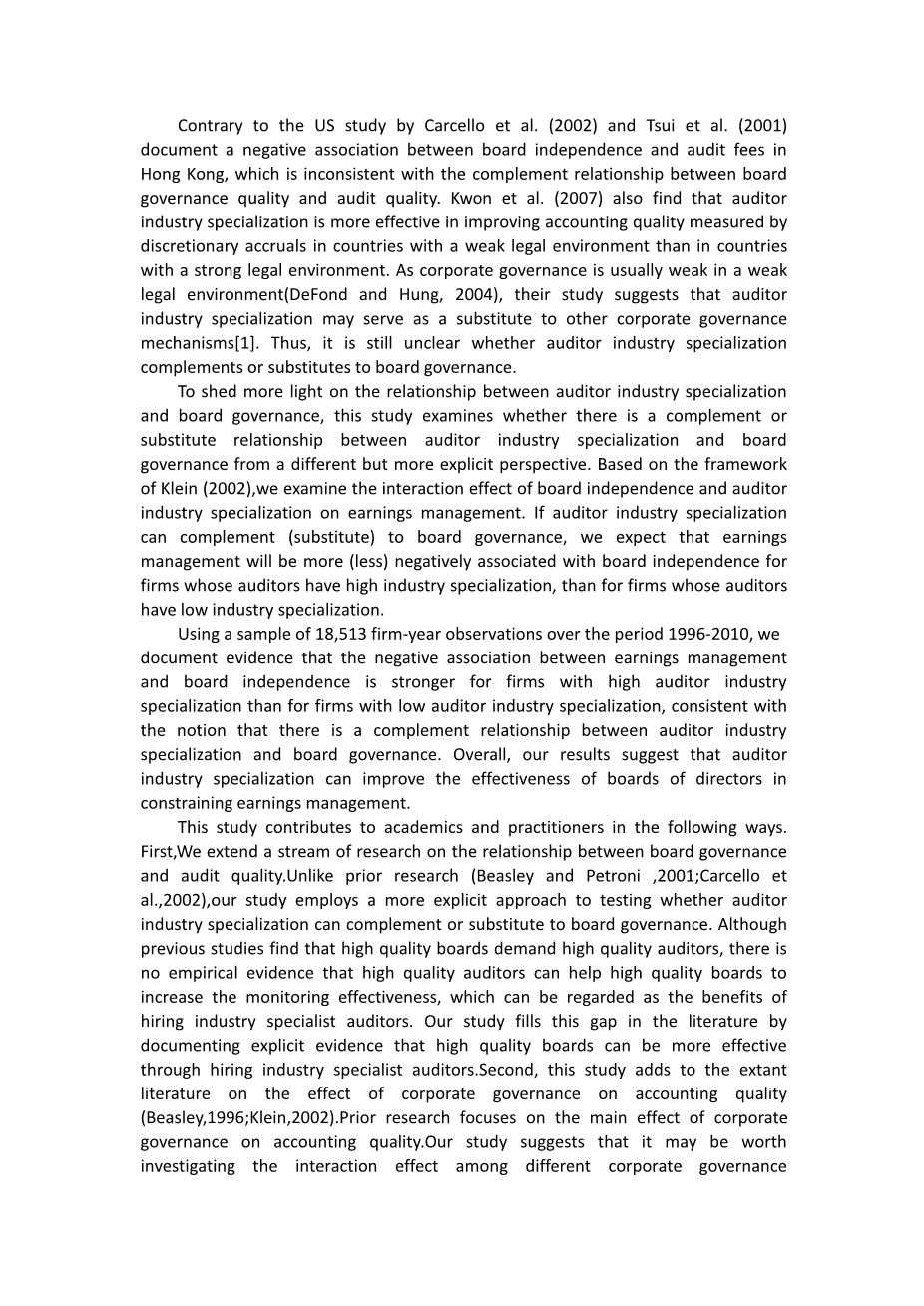

英语原文共 7 页
Auditor industry specialization,board governance, and earnings management
Jerry Sun
Odette School of Business, University of Windsor, Windsor, Canada, and
Guoping Liu
Ted Rogers School of Management, Ryerson University, Toronto, Canada
Abstract
Purpose – The purpose of this study is to investigate the interaction effect of auditor industry specialization and board governance on earnings management. This study examines whether board independence is more or less effective in constraining earnings management for firms audited by industry specialists than for firms audited by non-specialists.
Design/methodology/approach – The US data were collected from the RiskMetrics Directors database and the Compustat database. Regression analysis was used to test the research proposition.
Findings – It was found that earnings management is more negatively associated with board independence for firms audited by industry specialists than for firms audited by non-specialists,consistent with the notion that there is a complementary relationship between auditor industry specialization and board governance. The findings suggest a positive interaction effect of auditor industry specialization and board governance on accounting quality.
Originality/value – This study contributes to the literature by documenting explicit evidence that high quality boards can be more effective through hiring industry specialist auditors. This study also suggests that it may be worth investigating the interaction effect among different corporate governance mechanisms on accounting quality.
Keywords – Auditor industry specialization, Board governance, Earnings management, Auditing,Boards of directors, Governance, United States of America
Paper type – Research paper
Introduction
Industry specialist auditors have more industry-specific knowledge and expertise than non-specialist auditors (Dunn and Mayhew, 2004). Prior research (Balsam et al., 2003;Dunn and Mayhew, 2004) finds that auditor industry specialization is positively
associated with accounting quality, suggesting that industry specialist auditors can
provide high quality audit services to clients. Thus, industry specialist auditors serve
an important role in monitoring financial reporting process.
Industry specialist auditors may constrain earnings management not only through the audit of financial statements but also through their interaction with the clientrsquo;s internal corporate governance mechanisms including board of directors. Auditors may interact with the board of directors, as directors are involved in resolving the conflicts between management and auditors (Klein, 2002). Beasley and Petroni (2001) andCarcello et al. (2002) suggest that high quality boards of directors demand high quality auditors. If the interaction between the board of directors and auditors is effective, high quality boards will benefit from hiring industry specialist auditors. In other words,there may be a complement relationship between board governance and auditor industry specialization.
Contrary to the US study by Carcello et al. (2002) and Tsui et al. (2001) document a negative association between board independence and audit fees in Hong Kong, which is inconsistent with the complement relationship between board governance quality and audit quality. Kwon et al. (2007) also find that auditor industry specialization is more effective in improving accounting quality measured by discretionary accruals in countries with a weak legal environment than in countries with a strong legal environment. As corporate governance is usually weak in a weak legal environment(DeFond and Hung, 2004), their study suggests that auditor industry specialization may serve as a substitute to other corporate governance mechanisms[1]. Thus, it is still unclear whether auditor industry specialization complements or substitutes to board governance.
To shed more light on the relationship between auditor industry specialization and board governance, this study examines whether there is a complement or substitute relationship between auditor industry specialization and board governance from a different but more explicit perspective. Based on the framework of Klein (2002),we examine the interaction effect of board independence and auditor industry specialization on earnings management. If auditor industry specialization can complement (substitute) to board governance, we expect that earnings management will be more (less) negatively associated with board independence for firms whose auditors have high industry specialization, than for firms whose auditors have low industry specialization.
Using a sample of 18,513 firm-year observations over the period 1996-2010, we
document evidence that the negative association between earnings management and board independence is stronger for firms with high auditor industry specialization than for firms with low auditor industry specialization, consistent with the notion that there is a complement relationship between auditor industry specialization and board governance. Overall, our results suggest that auditor industry specialization can improve the effectiveness of boards of directors in constraining earnings management.
This study contributes to academics and practitioners in the following ways. First,We extend a stream of research on the relationship between board governance and audit quality.Unlike prior research (Beasley and Petroni ,2001;Carcello et al.,2002),our study employs a more explicit approach to testing whether auditor industry specialization can complement or substitute to board governance. Although previous studies find that high quality board
资料编号:[4476]


